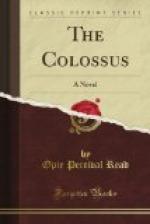Henry settled for the toys, and then continued his stroll about the city. A strange sadness depressed him. The old woman’s words—“and broke her heart, folks said”—rang in his ears. Had he been born as a mere incident of nature, or was it intended that he should achieve something? Was he an accident or was he designed? When he thought of his mother, his heart bled; but to think of his father made it beat with anger. When he became a member of the Witherspoon family, his conscience had constantly plied him with questions until, worn with self-argument, he resolved to accept a part of the advantages that were thrust upon him. Why not all? What sense had he shown in his obstinacy? What honor had he served? Why should he desire to reserve a part of a former self? Fortune had not favored his birth, but accident had thrown him in the way to be rich and therefore powerful. Accident! What could be more of an accident than life itself? Then came the last sting. The woman whom he loved, should she become his wife, would never know her name; his children—but how vain and foolish was such a questioning. Was his name worth preserving? Should he not rejoice in the thought that he had thrown it off? He stopped on a corner and stood in an old doorway, where he had blacked shoes. “George Witherspoon is right, and I have been a fool,” he said. “Nature despises the weak. I will be rich—I am rich.”
There was no half-heartedness now. His manner changed; there was arrogance in his step. Rich—powerful! The world had been his enemy and he had blacked its shoes. Now it should be his servant, and with a lordly contempt he would tip it for its services.
He turned into a restaurant, and in a masterful and overbearing way ordered his dinner. He looked at a man and mused: “He puts on airs, the fool! I could buy him.”
Several men who had been sitting at a table got up to go out. One of them pointed at a ragged fellow who, some distance back, was down on his knees scrubbing the floor. “Zeb, see that man?”
“What man?”
“The one scrubbing the floor.”
“That isn’t a man—it’s a thing. What of it?”
“Nothing, only he used to be one of the brightest newspaper writers in this city.”
Henry looked up.
“Yes—used to write some great stuff, they say.”
“What’s his name?”
“Henry DeGolyer.”
Henry sprang to his feet. He put out his hands, for the room began to swim round. He looked toward the door, but the men were gone. A waiter ran to him and caught him by the arm. “Sit down here, sir.”
“No; get away.”
He steadied himself against the wall. The ragged man looked up, moved his bucket of water, dipped his mop-rag into it and went on with his work. Henry took a stop forward, and then felt for the wall again. A death-like paleness had overspread his face, and he appeared vainly to be trying to shut his staring and expressionless eyes. The waiter took hold of his arm again.




